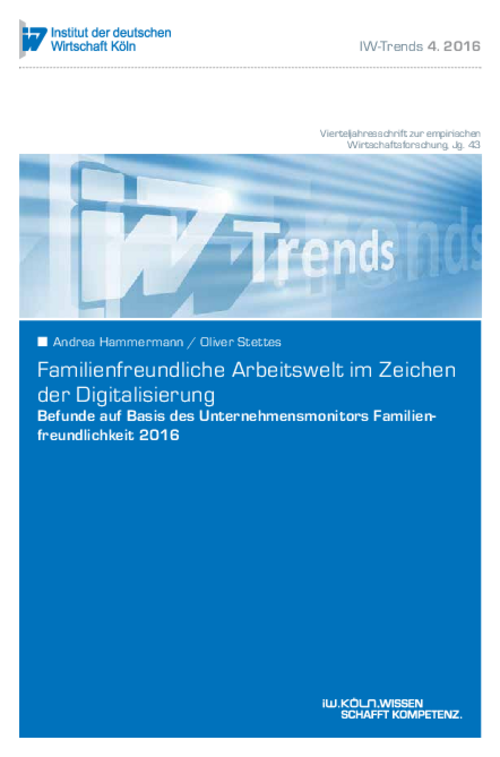According to the latest survey results from the 2016 Monitor of Corporate Family Friendliness, companies and employees are equally convinced that digitalization has the potential to improve the reconciliation of work and family life. Almost half of all extensively digitalized enterprises, those qualifying for what is coming to be known as Industry 4.0, have a distinctively family-friendly corporate culture. This compares with fewer than three out of ten of the less-digitalized companies of ‘Industry 3.0’. Fully digitalized firms are particularly characterised by their flexible workplaces and individual working time arrangements. Often the two go hand in hand. Over forty percent of employees who sometimes or frequently work mobilely confirm that their employer cultivates a distinctively family-friendly corporate culture, while the figure for those who never work mobilely is only a quarter. More exact analyses suggest that the probability of employees’ being content with the family friendliness of their employer’s personnel policy rises when they occasionally have the option to work outside their regular place of work. While frequent mobile working does not automatically lead to greater satisfaction, nor does it lead to greater discontent. More mobile working is by no means detrimental to the reconciliation of work and family life.

Family-Friendly Working Environments in the Age of Digitalization: Findings based on the 2016 Monitor of Corporate Family Friendliness
IW-Trends


Andrea Hammermann / Oliver Stettes: Familienfreundliche Arbeitswelt im Zeichen der Digitalisierung – Befunde auf Basis des Unternehmensmonitors Familienfreundlichkeit 2016
IW-Trends

More on the topic

What factors influence the career ambitions of people with disabilities?
Many companies in Germany report having difficulties not only in recruiting employees, but also in filling vacant management positions.
IW
Leadership in transformation: Megatrends and management as a driver of change
Leadership dynamics in companies are subject to constant change in order to meet the challenges of their time. Today, the greatest influences result from developments such as demographic change, globalization, individualization, structural change and ...
IW